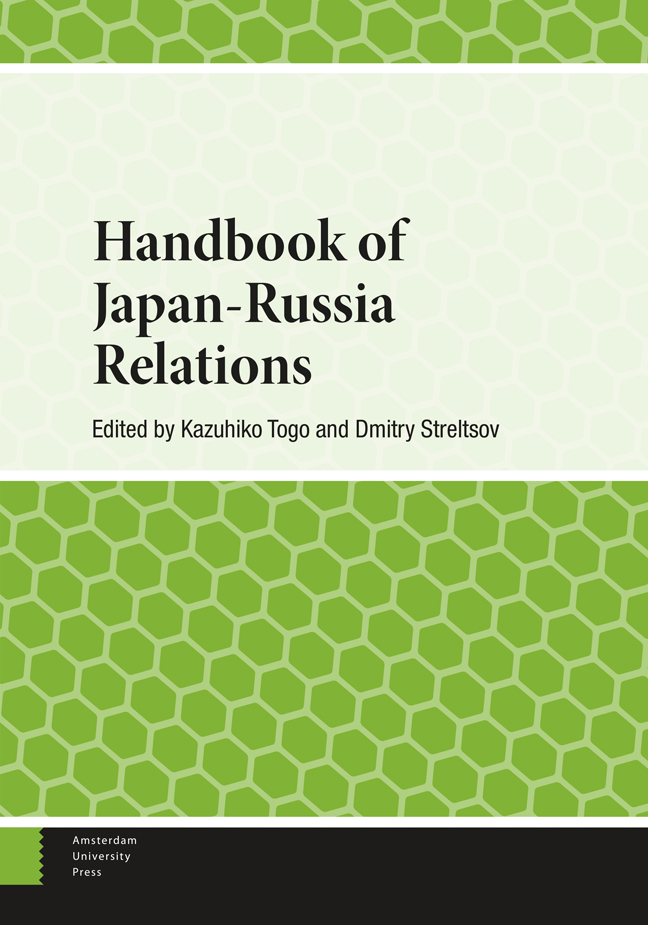Book contents
- Frontmatter
- Contents
- Dedication
- Acknowledgements
- Contributors
- Abbreviations
- Introduction
- Part 1 War and Peace: Diplomatic Relations and Security
- Part 2 Territory
- Part 3 The Economy and Energy
- Part 4 Disaster Cooperation
- Part 5 Culture
- Part 6 Perceptions of the Other
- Appendix 1 1956 Joint Declaration
- Appendix 2 Tokyo Declaration (1993)
- Appendix 3 Moscow Declaration (1998)
- Appendix 4 Irkutsk Statement (2001)
- Appendix 5 Foreign Ministry Statement (2022)
- Index
11 - Natural Disasters and Environmental Issues in Russia-Japan Relations: The Russian Perspective
Published online by Cambridge University Press: 26 March 2024
- Frontmatter
- Contents
- Dedication
- Acknowledgements
- Contributors
- Abbreviations
- Introduction
- Part 1 War and Peace: Diplomatic Relations and Security
- Part 2 Territory
- Part 3 The Economy and Energy
- Part 4 Disaster Cooperation
- Part 5 Culture
- Part 6 Perceptions of the Other
- Appendix 1 1956 Joint Declaration
- Appendix 2 Tokyo Declaration (1993)
- Appendix 3 Moscow Declaration (1998)
- Appendix 4 Irkutsk Statement (2001)
- Appendix 5 Foreign Ministry Statement (2022)
- Index
Summary
This chapter focuses on Russia-Japan cooperation in the fields of natural disasters and environment protection. It provides an overview of the degree to which these issues are covered in bilateral agreements, followed by detailed discussion of the three most salient cases of such cooperation: assistance in managing the consequences of the Chernobyl nuclear disaster; cooperation in dismantling Russian nuclear submarines and processing nuclear waste; provision of help in the aftermath of the 2011 Tōhoku earthquake and tsunami, followed by the Fukushima Daiichi nuclear disaster. The conclusion is that, even though routine work in these areas comprised a notable part of the bilateral agenda, it failed to alter the long-term dynamic of bilateral cooperation in a significant fashion.
Overview
Russia and Japan are close neighbors, and so cooperation in all fields is—at least nominally—on the agenda of bilateral relations. Cooperation in the field of natural disasters and environmental issues is no exception. According to the Russian Ministry of Natural Resources and Environment, environmental cooperation with Japan dates back to 1973, when the two countries signed the Convention between the Government of the Union of Soviet Socialist Republics and the Government of Japan for the Protection of Migratory Birds and Birds in Danger of Extinction, and Their Environment.
Based on the 1991 Japan-Soviet Agreement on Cooperation in Environmental Protection, the sides have established the Japan-Russia Joint Committee on Environmental Conservation for working-level discussions between relevant officials. Nevertheless, the meetings of the committee have only been held once in several years—in 1994, 1999, 2001 and 2003, with the last meeting mentioned on the Japanese Ministry of Foreign Affairs website dated 2006.
The Japan-Russia Action Plan, agreed upon by Prime Minister Koizumi Jun’ichirō and President Vladimir Putin in January 2003, devoted a separate section to the field of the environment, mentioning as specific areas thereof the issues of global warming as well as prevention of oil spills and marine pollution. In the document, the sides also stated their intent to intensify the activities of the above-mentioned Joint Committee on Environmental Conservation.
In February 2007, during the visit of Prime Minister Mikhail Fradkov to Japan, the sides signed the Program of Cooperation Between the Government of Russian Federation and the Government of Japan in the Adjacent Areas of the Two States in the Areas of Predicting, Warning about the Occurrence, and the Liquidation of Consequences of Earthquakes, Volcanic Eruptions, and Tsunami.
- Type
- Chapter
- Information
- Handbook of Japan-Russia Relations , pp. 209 - 219Publisher: Amsterdam University PressPrint publication year: 2024

